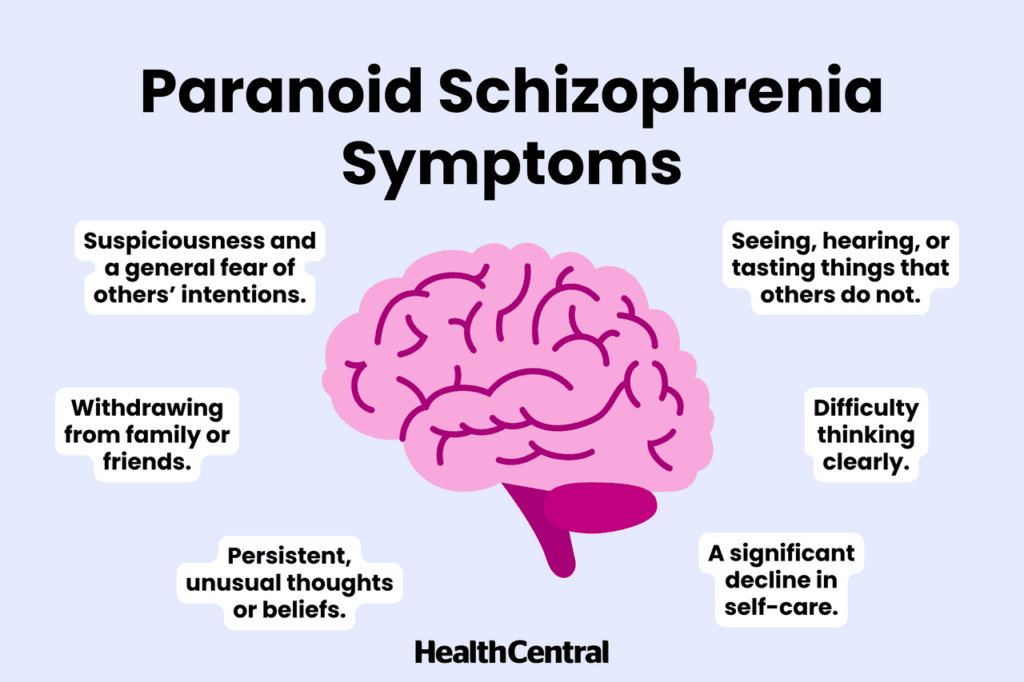
Paranoid schizophrenia is a severe mental disorder that affects how a person thinks, feels, and behaves. People with this condition often struggle with delusions and hallucinations, making it difficult to distinguish reality from fantasy. Understanding the symptoms, causes, and treatment options can help individuals and their families manage the condition more effectively.
Symptoms of Paranoid Schizophrenia
Paranoid schizophrenia primarily involves delusions and auditory hallucinations. These symptoms can cause extreme distress and interfere with daily life. Here are some key signs:
- Delusions: People often believe others are plotting against them. These false beliefs can lead to paranoia and mistrust.
- Hallucinations: Hearing voices is common. These voices may give commands, comment on actions, or threaten harm.
- Disorganized Thinking: Individuals may struggle to organize their thoughts, leading to erratic speech and difficulty in communication.
- Emotional Dysregulation: Some may experience intense emotions, while others might appear indifferent or detached.
- Social Withdrawal: Many people with paranoid schizophrenia avoid interactions due to fear or mistrust.
Causes and Risk Factors
While the exact cause remains unknown, several factors can contribute to the development of paranoid schizophrenia.
Genetics
A family history of schizophrenia increases the risk. However, having a relative with the disorder does not guarantee someone will develop it.
Brain Chemistry and Structure
Imbalances in neurotransmitters, such as dopamine, may play a role. Studies also suggest structural abnormalities in the brain could contribute to symptoms.
Environmental Triggers
Stress, trauma, or substance abuse can trigger symptoms in people with a genetic predisposition. Additionally, prenatal exposure to infections or malnutrition may increase the risk.
Treatment Options
Managing paranoid schizophrenia requires a comprehensive approach. A combination of medication, therapy, and lifestyle changes can significantly improve quality of life.
Medication
Antipsychotic drugs help reduce symptoms by balancing brain chemicals. Doctors may adjust dosages based on effectiveness and side effects.
Therapy
Cognitive-behavioral therapy (CBT) helps individuals recognize and manage delusions and hallucinations. Social skills training and family therapy also provide essential support.
Lifestyle Adjustments
A structured routine, a healthy diet, and regular exercise contribute to overall well-being. Avoiding drugs and alcohol is crucial, as these substances can worsen symptoms.
Living with Paranoid Schizophrenia
A strong support system plays a vital role in managing this condition. Family members, friends, and mental health professionals can provide encouragement and guidance. Seeking help early and sticking to a treatment plan can lead to a fulfilling life despite the challenges.
Conclusion
Paranoid schizophrenia is a complex but manageable condition. Understanding its symptoms, causes, and treatments empowers individuals to take control of their mental health. With the right approach, people with this disorder can lead meaningful and productive lives.

How to Practice as an Occultist with Paranoid Schizophrenia: A Guide for Safe and Powerful Work
Practicing occultism with paranoid schizophrenia comes with unique challenges and advantages. Your perception of reality differs from others, which can enhance your ability to evoke and communicate with spirits. However, strong precautions are necessary to maintain balance and safety.
Embracing Your Unique Perception with Paranoid Schizophrenia
Paranoid schizophrenia alters the way you perceive the world. This can make it easier to sense spirits, energy shifts, and hidden layers of reality. Many occultists spend years developing sensitivity to these forces, but your mind already works in ways that can tap into them naturally. Instead of fearing these experiences, you can learn to use them as tools.
Strengthening Communication with Spirits with Paranoid Schizophrenia
Your heightened perception can make spirit communication more vivid and immediate. Spirits may appear more clearly, and their voices may sound distinct. However, discernment is essential. Not all entities have good intentions, and some may exploit vulnerabilities. Always question the messages you receive and compare them with established wisdom.
Essential Banishing and Protection Practices to use with Paranoid Schizophrenia
Practicing occultism without protection is dangerous, especially if you experience paranoia or hallucinations. Grounding, shielding, and banishing rituals must be a priority.
- Daily Banishing Rituals – Perform simple yet effective banishing techniques like the Lesser Banishing Ritual of the Pentagram (LBRP) or a smoke cleanse with sage or frankincense. This clears negative energies and unwanted entities.
- Protective Symbols and Talismans – Wear protective amulets, draw sigils, or carry stones like black tourmaline or obsidian to create a barrier between yourself and harmful energies.
- Mindfulness and Meditation – Stay aware of your thoughts and emotions. Regular meditation helps you distinguish between spiritual messages and intrusive thoughts.
- Call on Protective Spirits – Work with guardian spirits, angels, or deities that align with your path. Build a relationship with them before attempting deeper evocation or spirit contact.
Recognizing the Difference Between Spirits and Symptoms with Paranoid Schizophrenia
One challenge of practicing as an occultist with paranoid schizophrenia is distinguishing real spiritual experiences from hallucinations. Some spirits may seem vivid but are products of the mind. Others may be genuine but influenced by fear or paranoia.
To navigate this, ask yourself:
- Does this entity offer wisdom or cause distress?
- Can I verify its presence through external signs?
- Does its message align with my spiritual practice or personal growth?
If an experience feels overwhelmingly negative or controlling, banish immediately and seek balance.
Building a Strong Support System
Practicing occultism alone can be risky. Connect with like-minded practitioners who respect your unique perspective. If you have a therapist, discuss grounding techniques to manage overwhelming experiences. A strong support network provides guidance and reassurance.
Final Thoughts
Your condition does not prevent you from being a powerful occultist. Instead, it offers unique strengths, such as heightened perception and an intuitive connection to hidden realms. However, strict protection and discernment are non-negotiable. By integrating spiritual practice with strong safeguards, you can explore the occult safely and effectively.
Embrace your path with awareness and strength. The unseen world is vast, but with the right precautions, you can navigate it with wisdom and confidence.

